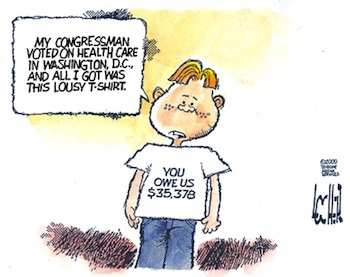- MENU
- HOME
- SEARCH
- WORLD
- MAIN
- AFRICA
- ASIA
- BALKANS
- EUROPE
- LATIN AMERICA
- MIDDLE EAST
- United Kingdom
- United States
- Argentina
- Australia
- Austria
- Benelux
- Brazil
- Canada
- China
- France
- Germany
- Greece
- Hungary
- India
- Indonesia
- Ireland
- Israel
- Italy
- Japan
- Korea
- Mexico
- New Zealand
- Pakistan
- Philippines
- Poland
- Russia
- South Africa
- Spain
- Taiwan
- Turkey
- USA
- BUSINESS
- WEALTH
- STOCKS
- TECH
- HEALTH
- LIFESTYLE
- ENTERTAINMENT
- SPORTS
- RSS
- iHaveNet.com
Michelle D. Bernard

If he continues on his present course, he may have a mutiny on his hands
Michelle D. Bernard is president and CEO of the
I am black. I am a woman. And, with all due respect, I think Harry Reid has lost his mind.
Yesterday, on the
Many assume that given my race and gender, I would support the
There are many reasons why I don't support the proposed healthcare legislation. I worry about how
Yet my reasons to oppose this bill are also personal: In 2005, I found a mass in one of my breasts. I was four months pregnant. I've never forgotten my doctor telling me that "cancer starts small." I had a biopsy and my doctor found a second mass. Two years later, I found a mass and my doctor found another. Thankfully, all four masses were benign. But I know I have an elevated risk for breast cancer, so I'm taking many precautions. Following the advice of my doctor, I do a monthly breast exam; I have a breast MRI every six months, and an annual mammogram.
I firmly believe that decisions about my care should be left between me and doctor. I worry that for millions of American women, these kinds of personal choices will increasingly become influenced by government bureaucrats.
We recently got a glimpse into the role that the government could play in making healthcare decisions. A federal task force recommended against annual mammogram exams and regular breast self-exams for women under age 50. They calculated that the costs of all of the false-positives that are created by screening women (like me) in their forties aren't worth the number of lives saved. The calculation goes like this: Every 2,000 mammograms for women between 39 and 49 prevent one cancer death. It takes only 1,300 for women between 50 and 59 to save a life, and just 337 for those between 60 and 69. From the government's standpoint, it's worth reducing the number of false-positive and unnecessary tests of women in their 40s even if that means sacrificing the lives of some women.
Many doctors were alarmed by the recommendations. An impassioned Dr. Daniel Kopans at
This is particularly true for minority communities. African-American women are nearly 40 percent more likely than white women to die of the disease. The mortality rate for black women under 50 is 77 percent higher than for white women. Shockingly, breast cancer deaths of African-American women are up 13 percent since 1974, even though the deaths of white women dropped 11 percent over the same period.
They are many reasons for these differences in mortality, but a primary cause is that African-American women are more likely to be diagnosed later. The single most important way to save more lives is earlier detection. Studies suggest that when black women follow the same preventive practices, most notably regular mammograms, as white women, their death rates are similar.
There was a public outcry about the mammogram recommendations, and the
Those familiar with the
Proposed cuts to the
We do need healthcare reform, particularly to help low-income and minority communities that today often don't have access to the quality care they need. But those reforms should focus on preserving what's best about our current system--its high quality and medical innovation--while fixing the system's flaws. There are many ways to improve the system without a massive expansion of government: allowing for the purchase of insurance across state lines and giving those who purchase insurance themselves the same tax advantages enjoyed by employers who provide insurance would both drive down prices and make insurance more affordable and accessible. Direct subsidies to help those who can't afford insurance themselves would be a better policy than forcing them into a one-size-fits-all, government-run program.
Americans want a better healthcare system--but they don't want government bureaucrats dictating care options and restricting the availability of certain treatments.
If comparisons to slavery are now fair game, Majority Leader Reid should consider this one. In 1839, slaves being transported on the ship La Amistad revolted and killed many of those holding them captive; when the matter was eventually taken up by the
It's not a perfect analogy, but I hope it gets a point across: If Reid and his fellow congressman continue on their present course, they may be facing a mutiny of their own.
Available at Amazon.com:
Chaos and Organization in Health Care
WORLD | AFRICA | ASIA | EUROPE | LATIN AMERICA | MIDDLE EAST | UNITED STATES | ECONOMICS | EDUCATION | ENVIRONMENT | FOREIGN POLICY | POLITICS
Healthcare - Harry Reid Wrong on History and Wrong on Health Reform